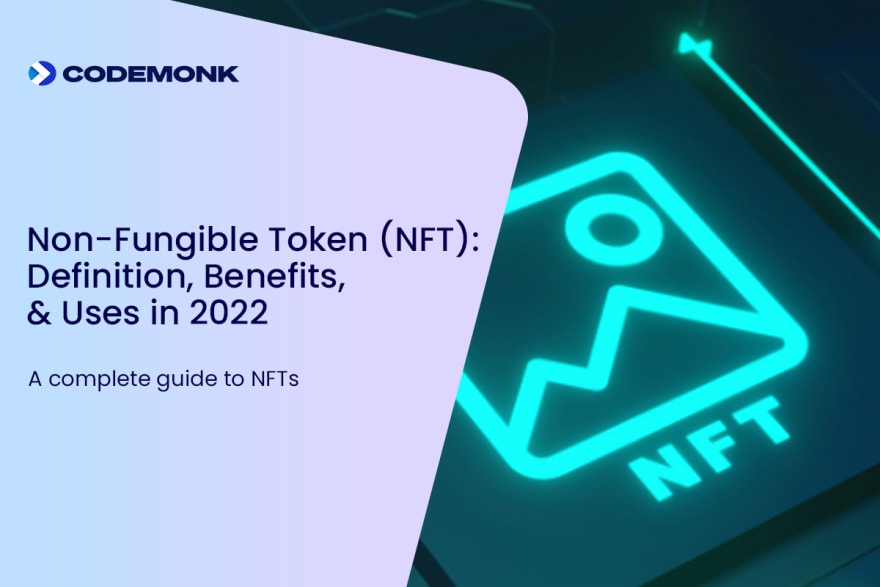While non-fungible tokens are a new class of digital assets, they have grown in popularity and sold for millions quickly.
Don’t believe us?
Let’s speak stats then!
In 2021, as NFTs, Grimes sold $6 million worth of digital art, including one of a kind and thousand copies of art.
Since NFTs for digital artwork have sold for millions—and tens of millions—of dollars in some cases, labeling them popular may be an understatement.
But why is there so much buzz around NFTs?
Let's understand it from scratch!
What Are Non-Fungible Tokens?
Non-fungible tokens, also known as NFTs, are a kind of modern collectible.
It identifies ownership of something unique, such as an original piece of art, real estate, music, or video.
The blockchain—which powers cryptocurrency—encrypts and secures NFTs.
The technology assures that the asset is unique and makes altering or counterfeiting NFTs challenging for hackers.
What Do You Mean By Fungible And Non-Fungible?
It is necessary to understand the business idea of fungibility to manage NFTs effectively.
Fungible goods are easily transferred since their worth is not contingent on individuality.
For instance, you may swap a $1 note for another $1 note and retain $1 despite the new note's serial number being different.
The opposite is true of non-fungible items.
Each NFT has distinct qualities and is not valued the same as other similar tokens.
Example of an NFT
NFT technology enables the transfer of ownership to the original item.
In the art world, selling NFTs can prove profitable.
Several examples that you may have heard of include the following:
- Christie's auctioned the digital work "Everydays - The First 5000 Days" for $69.3 million. (Business Insider)
- At Sotheby's inaugural curated NFT sale, a CryptoPunk NFT fetched $1.8 million. (Business Insider)
- Auction of an NFT of Jack Dorsey's first tweet nets $2.9 million. (Business Insider)
How is an NFT different from Cryptocurrency?
Blockchain technology underpins both NFTs and cryptocurrencies.
However, by enabling visual representations of physical assets, NFTs pave the way for the infrastructure's rebirth.
Additionally, NFT markets may compel users to acquire NFTs using a cryptocurrency.
On the other hand, Cryptocurrencies aspire to function as currencies by holding value or facilitating the purchase or sale of products.
For example, cryptocurrency tokens are fungible like conventional currencies such as the dollar.
Are Non-Fungible Tokens Safe?
While non-fungible tokens that leverage blockchain technology are typically safe, the distributed structure of blockchains makes non-fungible hacking tokens difficult (but not impossible).
One security issue associated with NFTs is that the mania for high-priced, headline-grabbing NFTs draws scammers and fraudsters.
Scammers may attempt to sell you anything if you are not alert by falsely claiming it is an NFT.
Some people may pose as creators to claim the right to sell NFTs they don't own.
The risk doesn't end here.
When you purchase an NFT, hackers may copy the image, video, or digital object that you hold.
So, it will help if you keep your eyes wide open while dealing with NFTs.
Union Budget Outcome 2022
1) Every digital asset’s income from the transfer, including NFTs and cryptocurrency, will be taxed at 30%
2) While reporting income from the transfer of digital assets, no deductions will be allowed, apart from the cost of acquisition.
3) Digital asset losses are not deductible from other income.
4) In the hands of the receiver, the gifting of a digital asset will be taxed.
Why Are Non-Fungible Tokens Important?
NFTs give artists and content creators a chance to commercialize their work; for instance, artists can sell their work online by sitting in their comfort.
Moreover, NFTs allow them to retain a significant portion of their earnings.
As an alternative, artists can incorporate royalties into their works to earn a portion of the proceeds when their works are sold.
It saves them a lot of time and resources, which they would otherwise invest in putting up their artwork in galleries or auctions.
It is an exciting aspect because artists are often not paid for future sales.
However, art is not the only option for NFTs to generate revenue.
Even celebrities like Snoop Dogg and Lindsay Lohan took the plunge and issued securitized NFTs of their unique experiences, talents, and moments.
Read more https://www.codemonk.ai/insights/non-fungible-token-definition-benefits-uses



Top comments (0)